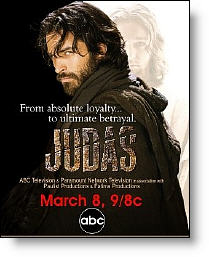Judas
 for some violent images.
for some violent images.
Reviewed by: Chris Monroe
STAFF WRITER
| Moral Rating: |
Extremely Offensive due to serious divergence from Scripture
|
| Moviemaking Quality: |
|
| Primary Audience: | Adults |
| Genre: | Drama |
| Length: | 2 hr. |
| Year of Release: | 2004 |
| USA Release: |
March 7, 2004 |


Is Jesus Christ a man, or is he God? Answer
If Jesus is God, how could he die? If Jesus died on the cross, then how can he be alive today? Answer
Was Jesus Christ God, manifest in human form? Answer
Is Jesus Christ really God? Answer
If Jesus was the Son of God, why did He call Himself the Son of Man? Answer
TRINITY—How can one God be three persons? Answer
JESUS’ CHARACTER—Is Christ’s character consistent with his high claims? Answer
Could Christ have sinned? Answer
What is “blasphemy”? Answer
Who was the real Judas Iscariot of the Bible?
Pontius PilateMary of Bethany
| Featuring |
|---|
|
Johnathon Schaech … Judas Iscariot Jonathan Scarfe … Jesus Christ Tim Matheson … Pontius Pilate Fiona Glascott … Claudia Procles Owen Teale … Flavius Bob Gunton … High Priest Caiaphas Mark Womack … Peter Rory Kinnear … Andrew Enzo Squillino Jr. … James Suzanne Bertish … Rohab Harry Peacock … John Paul Haigh … Matthew Georgia Mackenzie … Mary Magdalene See all » |
| Director |
| Charles Robert Carner—“Christmas Rush,” “Crossfire Trail,” “Who Killed Atlanta’s Children?,” “The Fixer” |
| Producer |
|
Fatima Productions Frank R. Desiderio Tom Fontana Marco Valerio Pugini—“Angels and Demons” Ann Wingate Fatima Productions Paramount Network Television Paulist Productions |
| Distributor |
|
American Broadcasting Company (ABC) Paramount Home Video |
“Judas” premiered on Monday, March 7, 2004 on ABC (USA). “Judas” is the final project of the late Father Ellwood “Bud” Kieser, C.S.P.—founder of the Humanitas Prize and Paulist Productions.
Knowing how one of Jesus Christ’s twelve disciples betrayed Him, one may wonder if the made for television movie “Judas” premiering on ABC might undermine the release of the film “The Passion of the Christ” that opened only eleven days prior. But the nearly simultaneous release of “Judas” seems to be done more out of convenience than any kind of malicious plotting, exemplifying writer Tom Fontana’s interpretation of Judas Iscariot as a betrayer. Talking with director Charles Carner also assisted in understanding the intentions behind exploring the character of one of the most infamous men in history.
Before Judas begins there is a caption stating that this movie is based on the relationship of Jesus and Judas taken from parts of biblical passages and historical research.
In the beginning of the movie, we see that Judas (Jonathan Schaech) lost his father at a young age and is now a wine seller, outspoken about his disgust of the Roman authorities and deemed an “agitator” by the Jewish high priest Caiaphas. The plot follows his journey as he discovers Jesus (Jonathan Scarfe), becoming Jesus’ disciple, a kind of betrayal of Jesus, and finally his suicide.
In my interview with the director Charles Carner, he explained that screenwriter Tom Fontana picked three main facts about Judas and extrapolated from them, which are: Judas is the one who helps bring about the death of Jesus; Judas believed the Messiah would be the one to overthrow the Romans; and that what Jesus said and did is opposite of how Judas expected the Messiah to act. From these three main ideas, Judas is put into a very realistic, human context that is intended for us to be able to understand him. Carner said the goal was to make the audience sympathetic toward Judas, to “feel” for him.
While there are many creative ideas built around these circumstances, some more significant issues about Judas are overlooked. The movie accurately depicts Judas being put in charge of the moneybox the disciples used, but it neglects showing how he used to pilfer money out of it (John 12:6). They do present him as someone obsessed with money, showing him suggesting they charge people a fee when Jesus performs a miracle. Perhaps this was created in lieu of showing him as a thief.
Another key element that is excluded is the fact that Satan entered Judas before he betrayed Jesus to the high priests (Luke 22:3). Carner divulged that presenting the idea of Satan entering Judas was “not the style of this movie” and that they wanted to “keep him understandable in human terms—something we could understand happening.”
The difficulty in this is that you cannot disregard these kinds of details. Yes, it makes him more relatable, but Judas would not have carried out what he did, had this not occurred.
It’s nice to see Judas Iscariot put into a real context, but it is a serious strain to compromise certain facts about him. In this production, Judas himself is betrayed by a friend, he loses his mother, and is rejected by the other disciples after Jesus’ arrest. Yes, these scenarios might endear viewers to him, but they did not necessarily ever happen. These could have been done without altering more well known facts.
Judas’ betrayal of Jesus is very certain in the biblical account. Judas entreats the high priests, asking what price they would give him, if he hands Jesus over to them. He knew what he was doing. In this film, he is more a victim of circumstance. He first takes the thirty pieces of silver initially as a help from Caiaphas for losing his mother. Then Judas asks Caiaphas what he would have him do. The actual betrayal is only alluded to.
As Carner described it, Judas was “persuaded” by the high priest and then “railroaded by the outcome.” This is an interesting interpretation since the idea of betrayal is severely downplayed. Jesus tells his disciples one of them will betray him, but we never see Judas ask if it’s him, nor Jesus’ verification following. And in the Garden of Gethsemane, Judas gives Jesus the infamous kiss, but Jesus never speaks his renowned line about being betrayed. It was like leaving out Julius Caesar’s line, “Et tu, Brute?”
Aside from these details with Judas character, one uplifting aspect is how Jesus is constantly reaching out to Judas with love and invitations to see things the right way. Judas constantly misunderstands Jesus real purpose, and Jesus does not fail to confront him in love about it, and give him opportunities to change. The end suggests that these ideas finally sunk into to Judas’ understanding and brought about some kind of repentance.
Fontana has embellished the character of the Roman centurion (here named Flavius), whose son is healed by Jesus. Although he is only mentioned briefly in the Gospels, he is more developed here as one of the chief soldiers in the household of Pontius Pilate (Tim Matheson). There is also a parallel betrayal that happens between Flavius and Pilate, which Carner explained was one of the great inspirations Fontana had when writing this script. It is very effective.
Before the tragic events of September 11th, this production was shot over two years ago in the country of Morocco. Carner explained that they were able to save on budget by using sets built there for the biblical movies produced by Turner Pictures. Additionally, there was also a Christian church near their location where crew could attend services over the course of the shooting.
Charles Carner, a professed believer in Christ, said this is the first time after 20 years of writing in Hollywood that he has been able to integrate his faith in a production so directly. Although he did not write the script, he said he was willing to direct it because he liked that Fontana’s script wasn’t postmodern. In this adaptation, “Jesus is human, but it doesn’t negate his divinity. I didn’t feel it would undermine the message of Jesus.” This project also provided an opportunity for him to share his faith in this industry.
For the past ten years Charles Carner has been on the board of Catholics in Media whose purpose is two fold: to provide an informal environment for Catholic media professionals to share their spirituality, and to celebrate and appreciate individuals and programming with content that uplifts and inspires people. Once a year they have a special luncheon and award outstanding work done in the industry. Last year, the award went to the feature film Seabiscuit.
Carner is currently still writing and is interested in doing more movies with biblical content. Directing “Judas” fits into the vision of the founder of Paulist Productions (Los Angeles), Bud Kaiser, of which this production is a part. Kaiser wanted to see films done on all of the twelve apostles, in order to show all different sides to Jesus’ life on Earth. Perhaps this will lead to similar projects for Carner.
The highlight of the entire experience is the character of Flavius and the excellent, honest performance the actor gives. He really outshines some of the other acting, as well as some of the overly melodramatic moments. Overall, Carner is glad to have waited two years to release this film, since he believes the limelight of Mel Gibson’s film will help draw attention to his.
See list of Relevant Issues—questions-and-answers.


We all know that in the “cup” was mankind’s sins and this is what He was repulsed by, thus proving He is God. For only God could be that reluctant to taste sin. But “fear”? Jesus was God incarnate therefore Love incarnate, and perfect Love casteth out all fear.”
The writers obviously feel that Jesus, as He IS, is just too much for them, so they re-created Him in their image. Rule #1: We are human; He is God.[Extremely Offensive/1]
[Extremely Offensive/1]
My main objection to this film is how Jesus was depicted. Quite weak and questionable about his purpose. Next time do a better job of getting the Biblical facts about Jesus and you will get the facts about His own disciples.
[Very Offensive/1]
[Extremely Offensive/1]
I was physically wincing throughout at the “artistic liberties” taken during the 2 hours this movie runs for. For instance Judas giving Jesus the idea to share the Holy Spirit with the 12 disciples so that they can perform miracles, Judas throughout seemed quite honorable but the Bible tells us he was nothing but a thief, and as for the scene where Jesus admits that maybe he lost his temper in the clearing of the temple and, get this, that he was wrong by getting angry!!!
Was there any redeeming quailties of this film? In a word no! I have never witnessed such a passionless crucifixion scene. The makeup was also terrible throughout for example the blood washes off Jesus in the rain scene leaving no trace of the whip marks. I think that to sum up this film is to say speculative and passionless. And then there’s the casting. Judas looked the part, evil, cunning, but Jesus looked like a ’70s Californian Jesus Freak and Tim Matheson as Pilate?
Maybe they should rename this movie as “The Incredibly Mixed Up (and Unbiblical) Adventures of Buddy Jesus and His Pal Judas.” See The Passion of the Christ and please miss this one.[Extremely Offensive/1]
[Average/1]
PLEASE share your observations and insights to be posted here.

My Ratings: [Good/3]